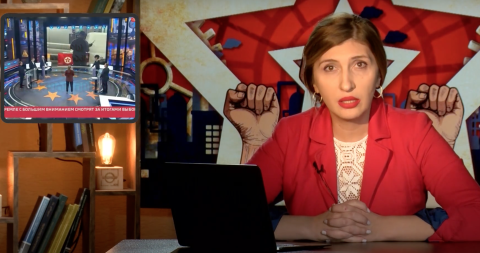
As Russian bombs rip through Ukrainian towns and civilians flee, journalists within and outside the country are countering false reports and filling the information gap caused by Russia’s news blackouts about the war. At TOK TV in Tbilisi, Georgia, Natia Kuprashvili put her team on full alert to make sure the news gets out to audiences who would be in the dark if not for courageous reporters.
“We have been working under stress since the beginning of the war, although we cannot compare ourselves to our colleagues from Ukraine,” says Natia, whose own journalists have come under assault in recent years from pro-Russian groups in Georgia.
Today, on International Women’s Day, all of us at ICFJ celebrate the amazing women in our network, including many who are bravely covering the war in Ukraine from inside as well as from frontline countries such as Georgia, which was itself invaded by Russia in 2008.
Natia, TOK TV’s executive director, is a proud member of ICFJ’s network. Her team is using all available platforms to spread the truth, including the app “FACT or FAKE,” which they created in 2020 with support from ICFJ.
“After the start of the war, we switched to emergency work mode,” she said. “In cooperation with our Ukrainian colleagues, we try to prepare verified information in Georgian and provide it to regional media.”
Natia says her journalists are working emergency shifts to maintain nonstop television broadcasting and live streaming on the platforms of partner organizations in the region. They are monitoring and analyzing Russian news broadcasts, and also fact-checking social media reports. They even beefed up their staff with freelancers to ensure they can keep their operations running around the clock.
She underscores the importance of their reporting, noting Russia has falsely claimed that both Ukraine and Georgia pose military threats: “It is clear to us that the fate of Georgia also depends on the fate of the war in Ukraine.”
Natia’s is among the many inspiring stories of women journalists working to spread truth in the midst of war and dangerous conditions. These include CNN correspondent Clarissa Ward and independent American photojournalist Lynsey Addario, both former ICFJ award winners who are unflinchingly reporting on the Russian invasion from inside Ukraine.
Other women in our network work under tough conditions elsewhere in the world, such as Srishti Jaswal, a young journalist who covers neglected communities in India, and Anna Catherine Brigida, a U.S. journalist covering immigration issues along the U.S.-Mexico border. You can read about them and others here.
If you are as inspired as I am, please make a donation to help us expand our work to even more women who are doing important journalism around the world, often risking their lives in the process. Thank you so much for your support.